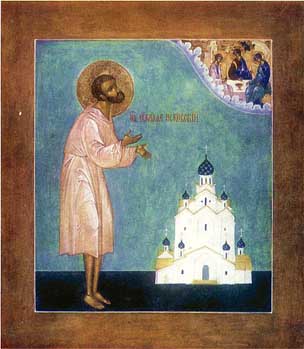
Blessed Nikolai of Pskov
Commemorated on February 28
Blessed Nikolai of
Pskov for more than three decades assumed the exploit of holy fool. And
quite a long while before death he acquired the gifts of grace of the Holy
Spirit and was granted the gift of wonderworking and of prophecy. The Pskov
people of his time called him Mikula (Mikola, Nikola) Sallos, which in
translation from the Greek means "blessed, fool", and even during his
lifetime they revered him as a saint, even calling him Mikula the Holy.
In February the year
1570, after a devastating campaign with an army of the Oprichniki against
Novgorod, tsar Ivan the Terrible moved against Pskov, suspecting treason and
preparing it a like fate of Novgorod. As the Pskov chronicler relates,
"the tsar was come... with great fierceness, like a roaring lion, as
though to tear apart innocent people and to shed much blood".
All the city prayed
for the averting of the tsar's wrath. Hearing the peal of the bell for matins
throughout all of Pskov, the tsar was reading the inscription on the
wonderworking Liubyatovsk (at Liubatov stood the tsar's army)
Umilenie-Tenderness Icon of the Mother of God (Comm. 19 March). "Be kind
of heart, – said he to his soldiers, – lay down the swords upon the stones,
and let the killings cease".

All the inhabitants
of Pskov came out upon the streets, and each family was on their knees at the
gate of their house, bearing bread and salt for the meeting of the tsar. On one
of the streets Blessed Nikolai ran out towards the tsar, astride a stick as
though galloping an horse, and cried out to the tsar: "Ivanushko,
Ivanushko, eat the bread-salt, and not Christian blood".
The tsar gave orders
to catch the holy fool, but he disappeared.
Having forbidden the
killings, Ivan the Terrible still intended to punish the city. The tsar heard
the molieben at the Trinity cathedral, he venerated the relics of holy
nobleborn Prince Vsevolod-Gabriel (Comm. 11 February), and he desired to
receive the blessing of Blessed Nikolai.
When the tsar arrived
at the cell of the saint, that one said: "Hush, come in, (wouldst thou
have nothing, traveller), to have a drink of water from us, there is no reason
thou shouldst shun it". The holy fool offered the tsar for a bite a piece
of raw meat. "I be a Christian and do not eat meat during Lent", – said
Ivan to him. "Thou drinkest human blood", – the saint answered him,
instructing the tsar "by many terrible sayings", that he should cease
the killings and not plunder the holy churches of God. But Ivan did not heed
him and gave orders to take the bell from the Trinity cathedral, and then, in
accord with the prophecy of the saint, the finest horse of the tsar collapsed.
The prayer and the
lecture of the saint awakened the conscience of the tsar. Frightened by the
coming to pass of the prophecy and denounced in his wicked deeds, Ivan the
Terrible ordered a stop to the plunder and fled from the city. The Oprichniki,
witnessing this, wrote: "The mighty tyrant... departed beaten and shamed,
driven off as though by an enemy. Thus did a worthless beggar terrify and drive
off the tsar with his multitude of a thousand soldiers".
Blessed Nikolai died
on 28 February 1576 and was buried in the Trinity cathedral of the city saved
by him. Such honours were granted only to the Pskov princes, and later on,
archpastors.
The
local veneration of the saint began all of 5 years after his death. In the year
1581, during a siege of Pskov by the soldiers of the Polish king Stefan
Bathory, to the blacksmith Dorofei appeared the Mother of God together with a
gathering of Pskov saints praying for the city, among whom also was Blessed
Nikolai (the account about the Pskovo-Pokrovsk Icon of the Mother of God is
located under 1 October).
And
still now also at the Trinity cathedral do they venerate the relics of Blessed
Nikolai of Pskov, who "of the flesh of folly wast, ... being manifest a
citizen of Mount Jerusalem, ... having transformed the tsar's might and fierce
mind to mercy".
© 1996-2001 by translator Fr. S. Janos.